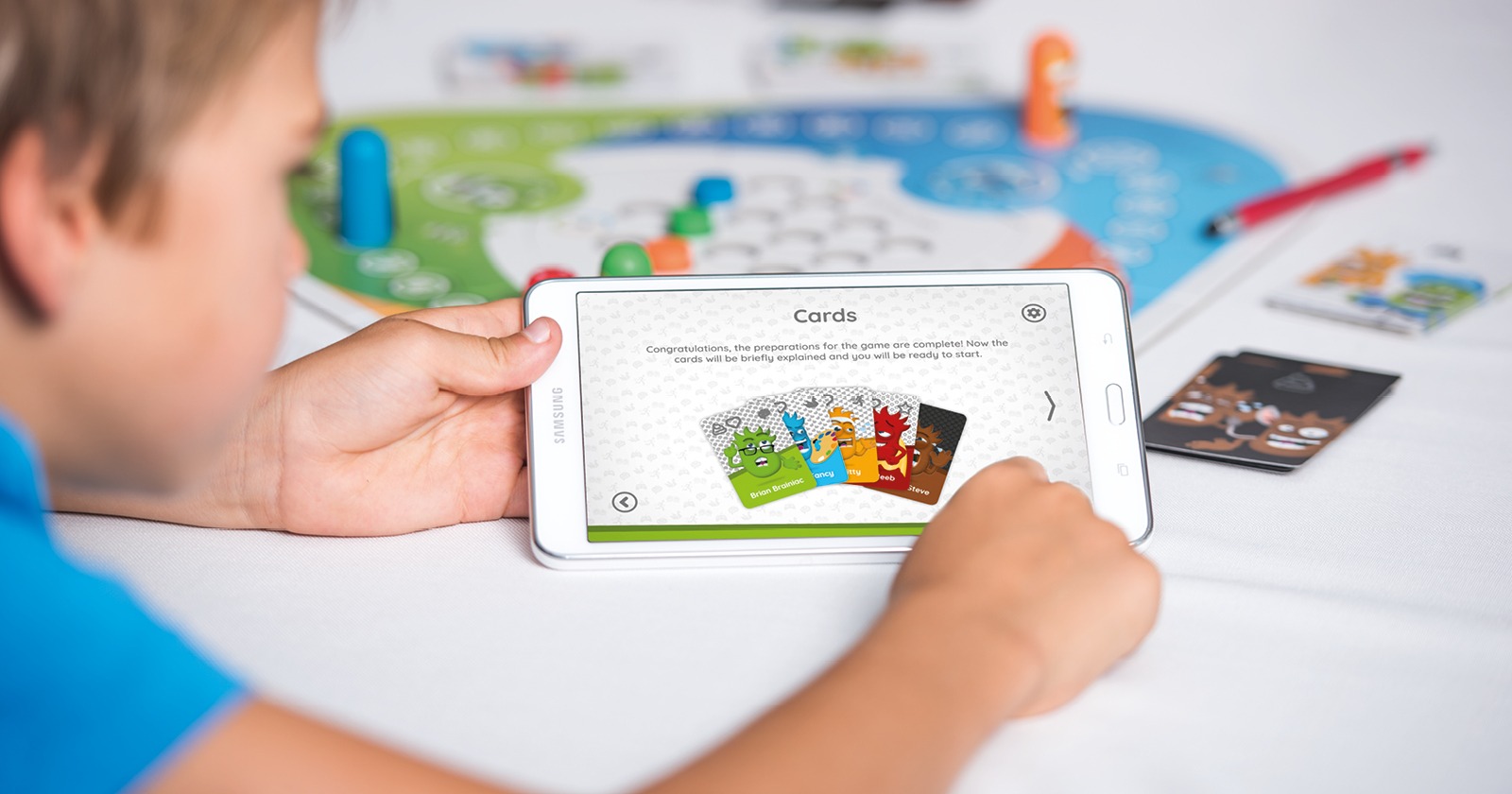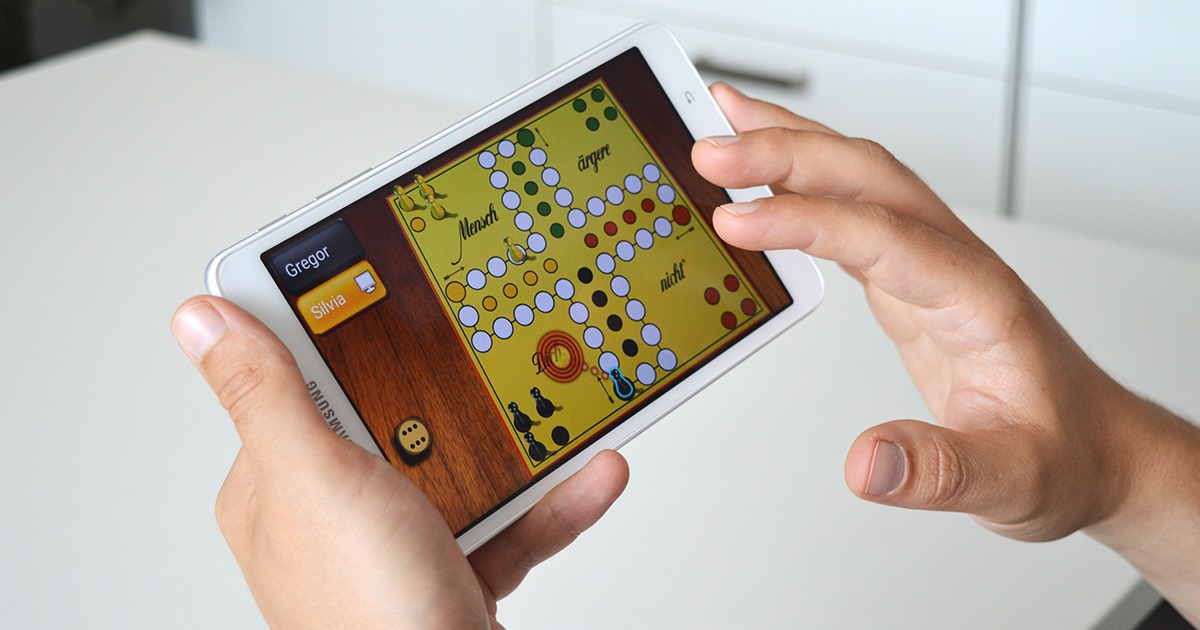
Hybrid Board Games – How apps and board games can work together!
The idea of so-called hybrid board games, i.e. a combination of board games with digital content, is in essence not a new one. As long ago as the 80s the first attempts were made with the Commodore 64, although it was admittedly rather impractical to take your computer to a board game evening along with its unwieldy monitor.
Quite a bit has changed in the time since, with ever more computing power being offered by ever smaller devices. These have become lighter and more portable and now fit into every trouser pocket in the form of smartphones. Ultra-fast and affordable data connections are making smartphones multimedia all-rounders. Today almost every teenager in the UK has their own mobile phone which they use on average for more than 220 minutes per day, mostly to play with digital apps.
From annoyance factor to tutor for game rules
And although a smartphone can quickly become a digital party pooper during sociable board game evenings, this doesn’t have to be the case!
In recent years an ever increasing number of publishers have begun to focus on the advantages of combining analogue and digital games. And the key consideration is the added value that use of an app provides for the players.
When starting a game an app can provide really useful assistance in the form of explanatory videos or even a tutorial round, which are familiar from computer games. Because let’s be honest – who wouldn’t rather use their time for playing than studying lengthy game instructions?
The Finnish start-up Playmore Games Inc., for example, has focused on precisely this area with its “Dized” app: teaching players classic board games quickly and easily with digital tutorials and rule explanations. The Finns are collaborating with established publishers such as CMON, Blue Orange, Iello, Hans im Glück and Stonemaier Games.

The app as a game master and storyteller
And some often large publishers are taking just a small step further by offering additional digital content such as atmospheric background music or an additional game version. Although these games can also be played without an app, this is often at the cost of the real added value that the app provides. This type of hybrid game is now also being offered by the German publisher KOSMOS under the “Play it smart” label. In the robber expansion (Germany only) for “The Settlers of Catan” KOSMOS brings the robbers to life digitally in the app and expands the game with chance events.
In my opinion, the next level in the fusion of analogue and digital games are so-called companion apps. A companion app usually assumes the role of the game master, as for instance in Mansions of Madness by Fantasy Flight Games. While the first edition of this game could be played entirely without an app, it is indispensable for the second and provides significant added value.
Hybrid games with age adjustment and resource management
Another step further in the amalgamation of analogue and digital game content is taken by the Austrian publisher Rudy Games’ family game INTERACTION, winner of the 2018 Austrian “Game of Games” award. For this game the app not only displays and distributes the more than 10,000 questions and tasks from the five categories of knowledge, creativity, sport, society and games but also adapts them to the age of each player. This means children get age-appropriate questions and tasks and adults are given game content that reflects their age. So everyone playing the game, regardless of their age, is constantly challenged but never overextended. In addition, the INTERACTION app learns more with each game, adapts better to the players’ age and blocks questions and tasks that have already been used. And thanks to regular updates INTERACTION also constantly offers new game content to discover.
In LEADERS, also from Rudy Games, a world domination strategy game set in the Cold War era, the app is even used as a central element of the game. Here every player, as well as a board game phase in which they place units, conquer new areas and are involved in battles, also has a secret app phase. In the app, players can use the points they have collected for new troops, to conduct clandestine research or to deploy diplomats and spies. The app is also used to forge secret alliances so that the players at the table never really know who is currently working with whom. The app also automatically adapts the costs and bonuses for units and development to the number of players. The game is either played with a device that is passed around or, preferably, in multi-device mode, which enables each player to take part with their own smartphone or tablet. This means that the app phase runs in parallel so there are no waiting times, which improves the flow of the game and makes it more fun to play.
Another bonus with LEADERS is the update capability, which means that players receive regular, and often free, new game scenarios and other features in the app. LEADERS also has a brief 4-page quick-start guide and the actual game rules are picked up thanks to the app the first time it is played.

Also digitized board games are becoming more popular
Digital versions of classic board games move on a further step while typically retaining the classic board game elements. The pioneers here were undoubtedly popular classics such as chess, Monopoly and Risk. In 2013 HASBRO entered into partnership with the video game giant EA Games, while the French group Asmodee has struck out on its own in this sphere with its subsidiary Asmodee Digital. With over 600 digital versions of board games, Tabletopia is one of the biggest players in this segment.
Recent years have shown that this development is not just a one-way street. For classic board games enjoy many advantages that digital games, despite boasting state-of-the-art technologies such as virtual reality, are simply unable to offer at the moment. The most important, of course, are social interaction with other players and the haptic play experience of analogue games. So it’s no surprise that video games are also increasingly focusing on hybrid components with the toys-to-life category. The pioneer in this segment was Activision with Skylanders.
Advantages and added value of hybrid games
My personal view is that hybrid games above all provide a bridge between analogue and digital games and put an end to the “either-or” debate. A game isn’t automatically good or bad just because it uses an app. Ultimately whether or not a hybrid game is successful depends on the game mechanics, how much fun it is to play and, of course, the added value provided by the app. For me the key benefits of an app in board games are:
The app provides step-by-step guidance as you play, with no need to read boring game instructions.
Different game versions, additional game scenarios and optional features ensure greater variety and infinite play options.
The app can automatically adapt game content, such as questions, tasks and the story, to the age and level of each individual player.
With regular free updates there is always new content and fresh scenarios, questions and tasks to discover, which means that the game is constantly up-to-date and exciting.
The app sparks the interest of children and adolescents, who are then more open to playing a game together at a table.
Smartphones and tablets become key elements of the game and so are no longer simply annoying sources of distraction.
Questions about the rules and doubts can be recognised and directly answered by the app, for example with videos, whilst the game is in progress. Including in the evening and at the weekend.






